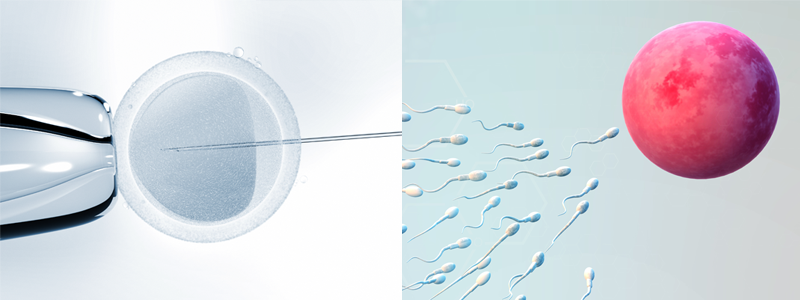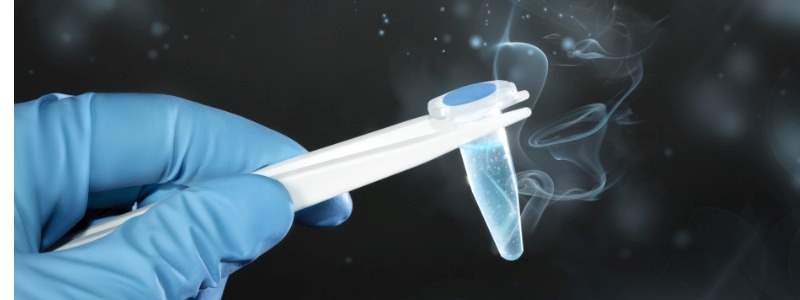What is an AMH test?
An AMH test is a blood test that measures your level of anti-mullerian hormone (AMH). This is a hormone given off by developing eggs in the ovary, and hence gives an estimate for a woman’s ovarian (egg) reserve; the higher the number of developing eggs, the higher the concentration of AMH in the bloodstream.
As a woman ages, a natural drop in AMH levels is normal. However, if a woman has polycystic ovary syndrome (PCOS), then her AMH level will likely be unusually high. This is because her ovarian “cysts” are, in fact, small ovarian follicles that failed to reach maturity, and so were never released from the ovary.
Please see 'What is the relationship between AMH and PCOS?' for more information.
What is a good AMH level?
Your AMH levels are considered ‘satisfactory’ if they are above 21.98 pmol/l (picomole per litre).
At any age, a score over 48 pmol/L is considered a relatively high AMH level and could be an initial indication of PCOS. Studies have shown that around 97% of women with a high AMH level of 71 pmol/L or more have PCOS.
|
Ovarian fertility potential |
pmol/l |
|
High |
40.04 - 67.9 |
|
Satisfactory AMH |
21.98 - 40.03 |
|
Low AMH |
3.08 - 21.97 |
|
Very low AMH |
0.0 - 3.07 |
If you would like to find out your AMH levels, or are worried about low/high AMH levels and the implications on your fertility, it is important you discuss this with a specialist.
To arrange a consultation with a fertility expert, get in contact with us here.
How is an AMH test done?
As a woman’s AMH levels are stable throughout her menstrual cycle, an AMH test can be done at any time.
At your appointment, a nurse will run through the procedure with you, check you are happy with the process, then draw a small amount of blood from a vein. This will be sent to our laboratory for analysis, and you will have the results back the same day.
If the results suggest that your fertility may need further investigation, your doctor will advise for you to have a full internal ultrasound scan.
When should I take an AMH test?
‘Ultimately, AMH testing empowers women, enabling them to make informed decisions on their future family plans. If you’re having trouble conceiving or simply want to be more informed, it is definitely worth considering. If you have a family history of early menopause or you suffer from an underactive thyroid, an early AMH test could help to reassure you that your egg reserve is not adversely affected. Equally, you may want to consider egg freezing if you are not ready to start a family.’ explains Professor Geeta Nargund.
What is a good AMH level for IVF?
Your level of AMH in the blood will help determine what IVF treatment is best for you. Here at CREATE Fertility, we do not have any cut-off point for AMH levels, and will allow any woman try IVF with her own eggs, as long as she is still ovulating.
However, it is important to note that different levels of AMH will impact your IVF success rate.
There is hope for IVF success even if your AMH levels are low - we have had patients with very low AMH levels (below 1.0 pmol/l) still successfully get pregnant! It is more important that we identify the best treatment for you dependent on your AMH test results.
For example, if you have low AMH, then you are likely to respond better to fertility treatment which uses fewer stimulating drugs such as Natural Cycle IVF or Natural Modified IVF.
Are AMH tests reliable?
The level of AMH in the blood is just one factor in your fertility assessment, and will serve as a useful guidance tool for your doctor.
The original AMH test was taken off the market as it was recognised as unreliable. However, since then technology has advanced and other techniques have been developed to support this test’s credibility. At CREATE Fertility, AMH tests are combined with an an antral follicle count (AFC) for accurate assessment. The AFC is done using an expert fertility ultrasound scan to examine the number of small follicles within both ovaries. CREATE pioneered advanced fertility ultrasound techniques, providing us with strong grounding and recognised expertise in this area.
How to increase AMH levels
As anti-mullerian hormone naturally decreases with age, many women wishing to get pregnant at 40 may wish to increase their AMH in order to boost fertility. However, as AMH is a result of the number of developing eggs in the ovary, there is no AMH diet or formula which can help this. It is biological.
AMH test cost
Many women have a female fertility test if they wish to have an accurate insight into their fertility. This does not include an AMH test because usually our doctors are able to estimate your ovarian reserve on the basis of the Advanced Ultrasound Scan. This internal scan provides a detailed image of your ovaries, the follicles within them and the blood flow to your uterus.
However, if you wish to have an AMH test, or the doctor recommends you to have one, we can perform this at CREATE Fertility for £105; the results will be available on the day.
No test is 100% accurate, but an AMH test can be a helpful way to assess your egg reserve if you are considering fertility treatment.
If you have any questions about this, or wish to book in an appointment with a fertility specialist, please contact us!





